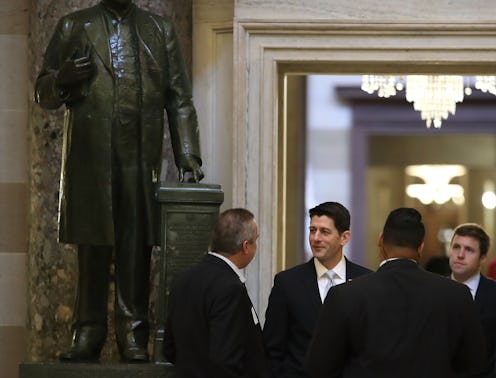News
Here's Why You've Been Hearing About A Government Shutdown Right Before Christmas

While the Republican-controlled Congress is busy patting themselves on the back for passing their first piece of major legislation in the Trump era, they've got another significant piece of work to take care of. There's also a potential government shutdown to worry about — and if that sounds like a big deal, it's because it is. You may be wondering why the government shuts down, but Congress knows that it's up to them to prevent that from happening.
Everyone knows that the last weeks in December are inevitably some of the busiest weeks of the year — and Congress has given itself possibly the most trying schedule of anyone. In addition to the massive tax reform bill they just passed, lawmakers also have to pass a budget plan for the 2018 fiscal year or risk shutting down the government just before Christmas.
Although there's been a lot of discussion of government shutdowns in 2017, they're definitely not part of how a government is supposed to function. The federal government runs on funding bills that Congress has to pass, and if everything is going smoothly, Congress passes a funding bill for the entire next fiscal year before the current fiscal year ends. The U.S. government fiscal year is Oct. 1 to Sept. 30 of any given year, but this year, Congress couldn't pass a bill to fund the government for the entire 2018 fiscal year before the end of the 2017 fiscal year.
The inability to pass a funding bill for FY 2018 comes from the competing priorities that Democrats and Republicans in Congress have. A funding bill has to get 60 votes in the Senate, which means that nine Democrats have to agree to it. The threat of a government shutdown back in April 2017 happened because of Trump's insistence on funding for his border wall and Democrats' insistence on blocking that. This time, Republicans want to add a significant amount of defense spending — and Democrats want to match that with non-defense spending, including funding for DACA, CHIP (a government health insurance program for children that's running out of money), and Obamacare, especially now that the tax reform package has gutted a key element of the Affordable Care Act.
While some Republicans have already tried to pass the blame for the potential shutdown on to Democrats, that logic doesn't exactly hold water. Republicans in the House and Senate have been unable to agree on their priorities for the emergency spending bill now needed to prevent a shutdown, and they've left Democrats entirely out of the negotiations — even though they need those Democratic votes for a bill to pass the Senate.
Trump, for his part, has claimed that the Democrats' demands on DACA amounts to support of illegal immigration and weakness on crime. In response, House Minority Leader Nancy Pelosi said that their demands merely attempt to address the "urgent needs of the American people."
The prospects for passing a long term spending bill aren't exactly great right now, so Congressional Republicans are instead turning to the possibility of an emergency stopgap spending bill that would merely push the problem — and the real negotiations over tricky issues like DACA — into the middle of January. No one wants to have numerous important government services cut off — or thousands of federal employees furloughed without pay — right around the Christmas holiday, so yet another short-term spending bill would be a sort of success, albeit a small one.
Republicans control both chambers of Congress and the White House, which should have given them plenty of opportunities to enact their policies. However, this hasn't happened, and the American people certainly aren't thrilled about what seems like a continually looming government shutdown. If the GOP had hoped to up their popularity going into the all-important midterm year, this probably isn't going to do it.